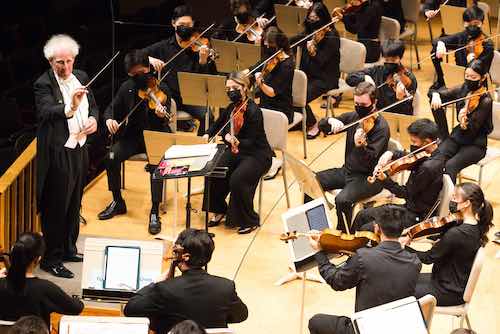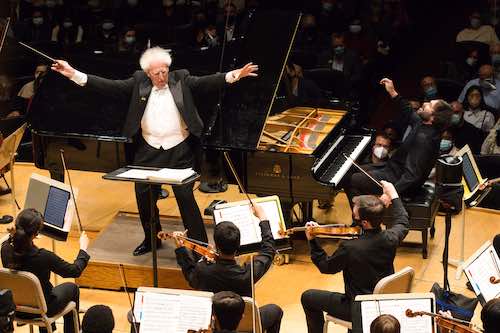Blazing night of Russian music benefits Ukraine war relief with Boston Phil Youth Orchestra

Benjamin Zander conducted the Boston Philharmonic Youth Orchestra Friday night at Symphony Hall. Photo: Hilary Scott
In marathon training, one of the keys to learn is pacing: give too much too soon and you won’t be able to finish.
Orchestras and long-distance racing aren’t exactly analogous, of course, but there is something particularly satisfying when a season peaks at just the right moment. That happened on Friday night for the Boston Philharmonic Youth Orchestra, which capped its tenth year in a blaze of Russian splendor at Symphony Hall.
To be sure, the BPYO has been one of the most consistently impressive and musically satisfying groups in town this past decade. This season was no exception. Though comprised mainly of teenagers, it’s an orchestra whose collective professionalism belies its membership’s juvenescence. What’s more, the players typically bring a sense of excitement, discovery, and intentionality to their performances that, in turn, enlivens even the most familiar repertoire.
That was the case with Friday’s concert, which offered Dmitri Shostakovich’s Festive Overture, Sergei Prokofiev’s Piano Concerto No. 3, and Piotr Tchaikovsky’s Symphony No. 6. Led by BPYO music director Benjamin Zander, the event also served as a benefit for victims of Russia’s war on Ukraine: all the night’s ticket proceeds went to Ukraine Tensions: No Child Forgotten.
In a way, it was fitting this type of undertaking would rely entirely on such distinctively Russian fare. Prokofiev was, after all, born in Ukraine and Tchaikovsky spent formative years there. If this music represents, as Zander put it in pre-performance comments, the “true face of Russia,” one could hardly have chosen better composers or pieces with which to support casualties of that country’s current junta.
Given this context, Shostakovich’s overture might have been the night’s outlier. Written to celebrate the 37th anniversary of the Bolshevik Revolution in 1954, the short work is, in fact, a statement of apolitical vitality. Whether or not one accepts Zander’s contention that the score celebrates Stalin’s demise the year before, it’s hard to imagine anything of such carefree ebullience coming from the composer’s pen during the dictator’s lifetime.
Friday’s reading captured the Festive Overture’s triumphant attitude. Brass fanfares gleamed, woodwind lines swirled exuberantly, and, though the strings sometimes sounded a shade underpowered, for five minutes there didn’t seem to be a care in the world.
Prokofiev’s Third Piano Concerto is a touch cloudier. Completed in 1921, the thirty-minute-long score boasts solo writing of breathtaking virtuosity and an orchestral accompaniment that’s equally deft and involved.
On Friday, Georgian pianist Alexander Korsantia was the soloist. A musician capable of both exquisite delicacy and supercharged, Yefim Bronfman-like projection, he proved a compelling headliner for this work, which thrives on bold contrasts of character and mood.
Accordingly, the night’s reading was highlighted by playing of bracing personality. The solos in the outer movements, with their tripartite formal schemes and ear-catching alternations of lyricism and irony, were brilliantly shaped and colored. So were the Andantino’s five variations, particularly the glowingly introspective No. 4, in which piano and orchestra seemed to be suspended in air.

Alexander Korsantia was the soloist in Prokofiev’s Piano Concerto No. 3 with Benjamin Zander and the BPYO Friday night. Photo: Hilary Scott
The BPYO’s contributions, by and large, smartly matched Korsantia’s playing in terms of articulation and tonal blend. Also, the ensemble readily intuited the pianist’s grasp of the music’s starkly shifting temperaments: everything (especially in the wild first movement) unfolded with the utmost naturalness. While some mellifluous spots in the finale might have flowed more smoothly, the concerto’s gossamer textures floated dreamily.
Friday’s audience rewarded the effort with a mighty ovation and Korsantia obliged with an affecting but none-too-sentimental encore of William Bolcom’s bittersweet Graceful Ghost Rag.
There was little overtly saccharine, either, in the BPYO’s performance of Tchaikovsky’s Sixth Symphony. Premiered just days before the composer’s death in 1893, this is, as Zander described it, one of the saddest pieces in the canon.
Yet for all the music’s foreboding, Zander’s take on it last night was refreshing and organic. Tempos moved smartly. Flexible phrasing highlighted all sorts of details that rarely come out, from the play of motives that make up the start of the Andante and the bewitching synthesis of ascending and descending scales at the end of the waltz to the Adagio’s opening gesture that, on Friday, sounded like falling teardrops.
Additionally, there was a fervency to this “Pathétique” that was simply gripping. The first movement’s development surged. Though a touch ragged at first, the march settled into something blistering, muscular, and thrilling. And the finale seemed, at times, to be as much about color and gesture as thematic and expressive development. Suffice it to say, this was a Tchaikovsky Sixth in which every note counted.
The same can be said of “Nimrod” from Elgar’s Enigma Variations, which Zander and the orchestra played afterwards as a tribute to the ensemble’s graduating members. Often wrongly considered a funereal salute, the movement here functioned rightly as a soaring gesture of friendship.
Posted in Performances